Hydrogen for heating | UK walks back pledge that 'no-one will have a gas boiler ripped out of their home'
Department of Business, Energy and Industrial Strategy had made promise in official LinkedIn post

Department of Business, Energy and Industrial Strategy had made promise in official LinkedIn post
